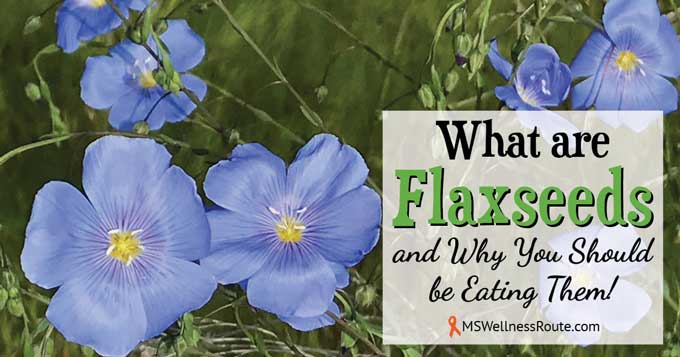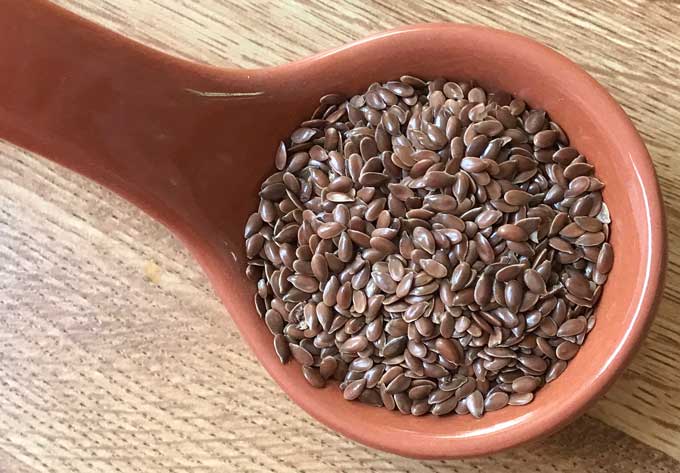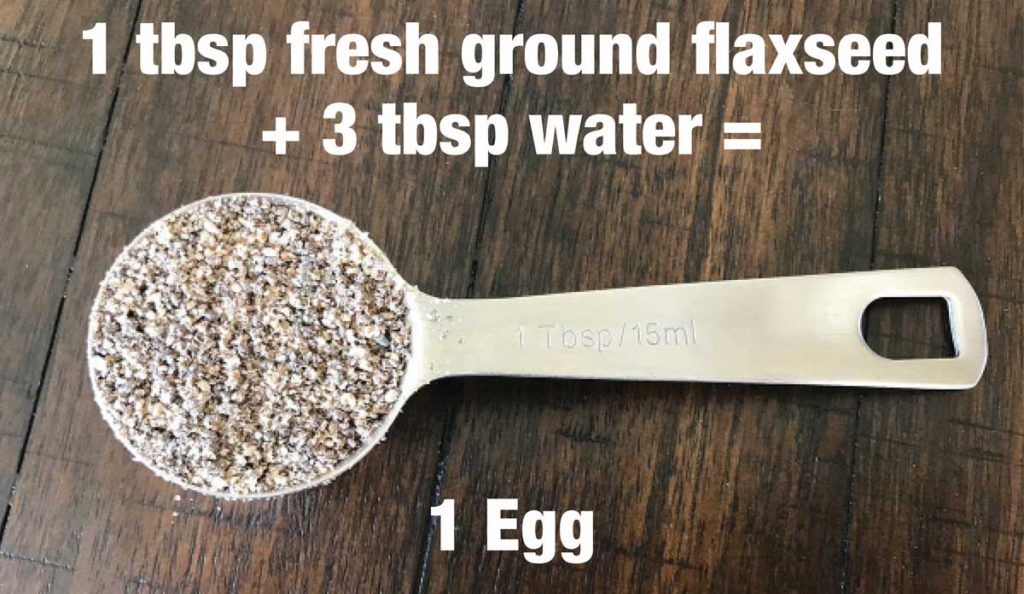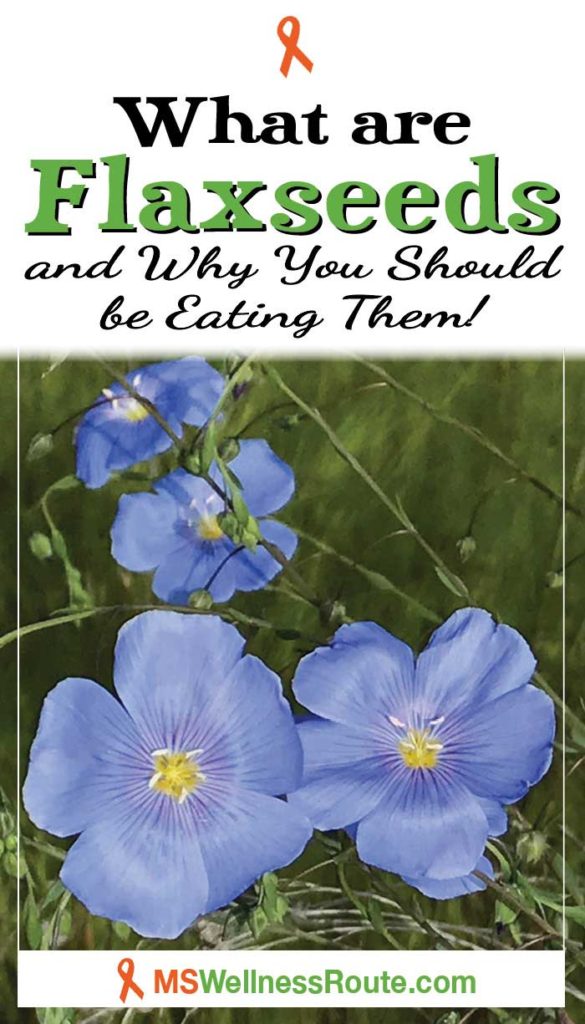Last Updated on November 30, 2023 by Cathy

Isn’t it funny how something can be right under your nose, but you never really pay attention? For example, these gorgeous blue wildflowers pop up every May and June around my house. I’ve enjoyed them for many years. As their growing season ends they drop tiny seeds all over the ground. I thought the only use of these seeds was for propagating.
It wasn’t until recently when I was researching flaxseeds that I finally made the connection. I knew the name of my pretty wildflowers was Blue Flax. But… I didn’t realize I’d been eating their seeds for several years! It’s funny how I never made the connection before.
Blue Flax
The plant flowers for only about one month. By the end of June, they develop seed pods where the plant eventually drys out and dies. The seeds then begin to drop all over the ground so they can propagate for the next year.
The flax plant is part of the Linaceae family, it’s also known as linseed. It is a very versatile plant that’s used as food and textiles. Such as bed sheets, table linens, underclothes, and linseed oil.

The plant stands about 18″ tall and comes in a sky blue color, it also comes in yellow. The seeds come in two different colors. Dark brown from the blue flowering plants and golden brown from the yellow plants. They both have a similar nutritional value except for a type of yellow flax called Linola. Unlike the others, it has very low omega-3 fatty acids.
Benefits of Flaxseeds
Flaxseeds have a very high nutritional value. It’s a rich source of omega-3, high in fiber, high in antioxidants, and supports digestive health. It also contains vitamin B6, folate (vitamin B9), and minerals like magnesium.
According to the USDA’s National Nutrient Database, 2 tablespoons of ground flaxseeds contain:
- Carbohydrates- 4.04 grams
- Dietary fiber – 3.8 grams
- Protein – 2.56 grams
- Total fat: 5.90 grams
- Calcium 36 milligrams
- Magnesium- 55 milligrams
- Phosphorus – 90 milligrams
- Potassium – 114 milligrams
- Sodium – 4 milligrams
- Zinc – 0.61 milligrams
Flaxseeds are a Great Source of Omega Fatty Acids
Flaxseeds are one of the best places to get omega-3 and omega-6 fatty acids. They are very essential for the brain, heart, joint, memory, nerve, and skin health. They help protect against chronic inflammation which contributes to autoimmune diseases, cancer, and heart disease.
Omega fatty acids are vital for the body’s cells to function. They contain both EPA and DHA which is important for neurological and brain function. Most people don’t eat enough omega-3s and way too much of omega-6.
Eating too much omega-6 usually comes from processed oils. such as canola, corn, safflower, and soy. There should be an equal balance of omega-3 and omega-6. Too much of omega-6 causes inflammation. You can get omega-3 through both animal-based foods and plants.
Omega-3 sources:
- Chia seeds
- Cod liver oil
- Fish (anchovies, herring, mackerel, salmon and sardines)
- Flaxseeds, ground
- Flaxseed oil
- Walnuts
The myelin sheath is mostly made of fat which comes from fatty acids. Eating an equal balance of omega-3 and omega-6 increases the myelin’s fat content. Which is especially important for people with multiple sclerosis.
High in Protein
Flaxseeds are also high in protein which is important for your blood, bones, muscles, and skin. It also helps to repair and rebuild tissue by fueling every cell in our body. Proteins help your immune system. They give your body energy to fight off bacteria and viruses. Protein is one of the most important nutrients for your overall health.
Where to Buy Flaxseeds?
You can buy flaxseeds at your favorite health food store or in many local grocery stores. You can also buy them online which is nice since it will be delivered directly to your home. Flaxseeds are also found in the bulk section at the grocery store making them a lot cheaper and saving you money. This is what I like to do since it’s always nice to save money.
However, ground flaxseeds go rancid pretty quickly even as soon as one week. If you purchase a bag of ground flaxseeds you don’t know how long that bag has been sitting on the shelf. So you may be buying a bag where the seeds have already gone bad.
Whole Flaxseeds vs. Ground Flaxseeds

If you eat whole flaxseeds your body will have a harder time trying to digest it. The seeds end up passing through your intestines undigested. But, if you buy them already ground up they go bad pretty quick.
It’s best to buy whole seeds then grind them up yourself using a coffee grinder. If you haven’t used a grinder before don’t feel intimidated, it’s really simple. I usually only grind enough to last one week.
Whole flaxseeds last about one year when stored in a dark cool area. But, to be safe I also keep the whole seeds in a separate glass jar in the refrigerator.
It’s best to keep them in a glass jar, not metal or plastic, and keep it in your refrigerator. Make sure you thoroughly clean your grinder after each use. The oil from the flaxseeds will go rancid and you don’t want to contaminate your next batch.
Adding Flaxseeds to Your Diet
It’s extremely easy to add ground flaxseeds to your diet. Add some to your smoothie or sprinkle them over your food, they go great with vegetables, meat, and baked goods. I like to eat about two tablespoons each day.
Flaxseed oil has a very low smoke point so it’s best to avoid cooking with it. Instead, use it as salad dressings, sauces, and in your smoothies. Flaxseed oil makes a great moisturizer when it’s applied to your skin.
You can use flaxseeds as a substitute for eggs when cooking:
• 1 egg = 1 tablespoon of finely ground flaxseeds + 3 tablespoons of water

Mother Nature’s Laxative
Flaxseeds aren’t only high in healthy oils (omega fatty acids), but they are also high in fiber. This makes flaxseeds a great natural laxative when you’re constipated. Eating too many flaxseeds can cause problems so it’s best not to eat too much.
It’s very important to keep things moving through your digestive system to get rid of food waste. If you struggle with walking and you sit for long periods of time it will cause your digestive system to slow down. Including 1-2 tablespoons of ground flaxseeds, every day can help.
Flaxseeds Benefits
Flaxseeds offer so many health benefits and it costs such a small amount of money. It is worth trying to include about two or three tablespoons of fresh ground flaxseeds into your diet every day.
Tip: Don’t eat a lot of flaxseeds all at once, it can cause bloating, gut pains, and possibly a quick run to the bathroom. It can also cause your constipation to get worse if you don’t drink enough water.
Quick Links to Information in This Post:
Foods That Are Highest In Fiber
Get Access To My FREE Library!
Get the password to my library with MANY wellness printables here by filling out this form:
Want to remember this health tip? Save it to your favorite Pinterest board!

References:
USDA Branded Food Products Database





